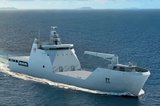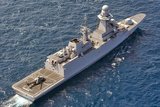Amid a growing row over the impending decision to offer a £1 billion ($1.4 billion) Royal Fleet Auxiliary (RFA) Fleet Solid Support (FSS) ship programme to international suppliers, the UK MoD has moved to defend its record in naval shipbuilding.
The FSS vessels will support the UK Royal Navy’s new Queen Elizabeth-class carriers and the wider strike group once in service with the RFA, which also operates the Tide-class fleet tankers (pictured) and Bay-class Landing Ship Docks.
In a release issued on 19 April, UK shipbuilding union GMB argued that the FSS class were military vessels and thus should fall under the guidelines set by the National Shipbuilding Strategy to keep all naval warship manufacture inside the country.
The GMB release stated that the FSS order will go out to full international tender on 30 April, adding that shipbuilding companies from Germany, Italy, the Netherlands, Poland, South Korea and Spain attended a recent MoD-organised industry day on the FSS programme.
The latest of the RFA’s new Tide-class tankers – RFA Tidesurge – is currently in Falmouth undergoing outfitting ahead of entry into service. The four-ship £450 million programme was won in 2012 by Daewoo Shipbuilding and Marine Engineering and experienced a series of delivery delays and cost overruns.
In response to the GMB statements, an MoD spokesperson said that all of the UK’s warships are built in the UK, with the Type 26 frigate programme focused on BAE Systems facilities in the Clyde and the Type 31 light frigate destined for other UK shipyards.
‘We are launching a competition for three new Fleet Solid Support ships this year and strongly encourage British yards to take part,’ the spokesperson added.
However, UK yards are hampered through a combination of lack of capacity to accommodate such a large programme and the likelihood that foreign competitors will be able to undercut any bid due to state subsidies and other governmental backing. Shipyards in the UK receive no such support when competing in the international market.
In 2017 a row erupted between France and Italy after the French government nixed an attempted takeover of STX by Fincantieri. The decision by France to exercise pre-emption rights on STX’s shares of STX France effectively brought the company under state control, with the Italian government at the time that it ‘deeply regretted’.
Subsequent negotiations saw the French and Italian governments gaining equal shares in the company.
Meanwhile a ground-breaking ceremony will take place on the new £132 million facility in Lossiemouth, UK, that will become the home of the RAF’s P-8 Poseidon MPAs.





















